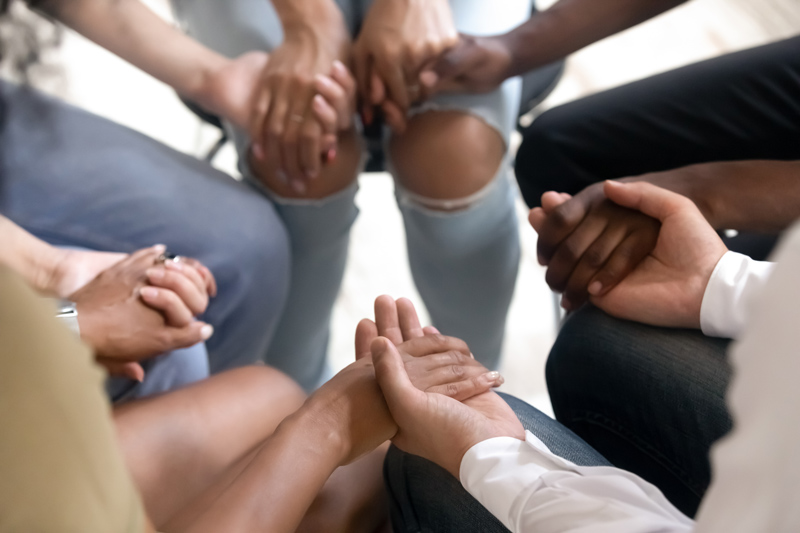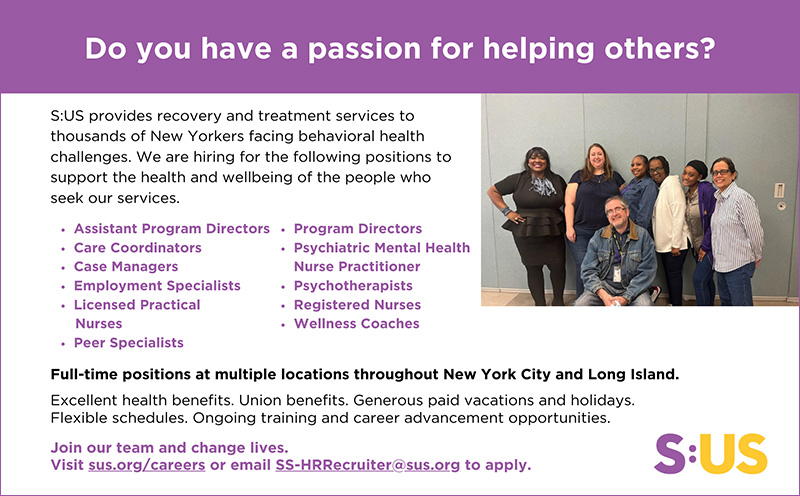This article is part of a quarterly series giving voice to the perspectives of individuals with lived experiences as they share their opinions on a particular topic. The authors are served by Services for the UnderServed (S:US), a New York City-based nonprofit that is committed to giving every New Yorker the tools that they can use to lead a life of purpose.

We’re New Yorkers in our 50s and 70s, who have been receiving services from S:US over the last nine to 22 years, such as housing, help with Section 8 housing vouchers, counseling, therapy, medicine, and weekly wellness checks. We’re all living with serious mental illness.
No family is unaffected by mental illness and substance use. Mental illness is the leading cause of disability worldwide and only 9% of the 21 million Americans with drug or alcohol addiction challenges are receiving treatment. With the right set of supports and by working together, people like us can recover, lead productive lives, and move past our challenges.
Mental Health and Other Challenges
We’ve overcome domestic violence, homelessness, depression and other mental illness, and substance use disorder. We’re all grateful for where we are now and the help we’ve received to get here.
“I’m a living miracle because not only did I have to go through domestic violence and hope and pray that I come out on the other side of that, but I could have been blind. I am blind in my right eye because of domestic violence, but I’m still alive, and I still have the use of one eye,” said Regina. “And if it wasn’t for S:US giving me that love, that support, that encouragement to keep on going, I have no clue where I would be right now… My healing really came from being supported by S:US and supporting other people in S:US while I was a resident. That to me was the groundwork of my healing.”
“I went through the shelter system. I was homeless for three or four years, and I had to go to a shelter in Brooklyn, in East New York. From there, I ended up going into one of S:US’ houses, and then I moved here to another S:US house. I’ve been here for about 22 years, in a one-bedroom apartment, just by myself. I’m one of the oldest residents here,” said Raymond. “My healing journey has been up and down because I’ve been really depressed at a certain time of my life due to the passing of a lot of my peers and family members.”
Herman said, “There’s no recovery from [a] mental disorder. Depression is a constant battle that never ends. It has no beginning, and it has no end. You can only feel good sometimes, but most of the time, 80% of the time, you have depression inside of you that you try to stay stable as much as you can. That’s the only way out: try to stay stable and try talking to people, try to speak to family members, and stay around people all the time.”
“I get in the way–that’s the only thing that gets in the way of my recovery. If I allow certain things to affect me, if I don’t talk about them, they fester in me. There are certain things I know I can’t do. And if I choose to do them, then here we go,” said Raymond. “One time I was in a really bad situation with my rent, and the reason I was in a bad situation was because I was using. I would quit, but I wouldn’t stop.”
Encouragement Helps Us Overcome Adversity
One thing that has really helped all of us is encouragement from our family, friends, S:US, and therapists.
“My story, even though it’s unique, is one that I share with a million people: Adversity. When you are faced with adversity, what do you do? You have your pity party, then you pick yourself up by your bootstraps and you keep pushing, you keep on fighting for the person that you know that you can be. And S:US will not only care for you while you’re fighting for your existence, but they’ll also fight for your existence right along with you,” said Regina. “They made me feel like I was worth the help. They made me see that just because I went through so many difficulties, that does not compare to finding my strength again, finding who I am again. They were very instrumental, in the encouragement aspect. They encouraged me to go forth with my dreams of becoming an actress. If I hadn’t received that encouragement from S:US, friends and family, I would not be in the position that I’m in now.”
“S:US has given me a lot of backup with [the] therapy they give me once or twice a month and [by] calling me once a week. I’m very grateful for all the members of the staff of S:US because they show compassionate care for human beings that’s struggling with mental disorder/s, and I’m one of them that has the ailment. I appreciate all that I can get from S:US,” said Herman.
Raymond said, “I have a therapist, Emma. The reason I searched her out is because one of my daughter’s mothers passed away, and I was going through a whole lot. I went to find a therapist, and I’ve been seeing her for seven years. And that helps me a lot.”
Giving Back
One of us, Regina, loves helping other S:US residents and even eventually became a Peer Specialist with S:US! People with lived experience of mental health challenges, like us, can help others in a unique way. We serve as role models, lending our peers the benefit of our own learned lessons and experiences in recovery. Peer to peer support helps individuals explore and realize opportunities for community participation, including employment, and pursue social and recreational opportunities. Peers also help each other maintain a physically healthy lifestyle and actively take charge of their own life.
“Before I became a Peer Specialist, I would advocate for people who were in S:US as a resident. I would teach them the ropes; this is what you do, this is what you’re not to do. This is how you secure your premises so that no one gains entrance in it. Keep your nose clean. Always meet with your counselor. Pay your rent so that you have a better standing when you move on. You can always say, ‘Hey, look, S:US was my landlord for X years and they can always give you a very good report.’” said Regina. “I jumped at the opportunity to give back to S:US because they’ve given me so much. I became a Peer Specialist, and everything has been so beautiful. My clients, my residents are beautiful. I literally work right across the street from where I grew up. It’s like life coming full circle for me. So, this is absolutely incredible, even with the challenges, too.”
Messages for Others Experiencing Similar Challenges
We have encouragement to share with people who may be having a hard time and experiencing some of the challenges that we’ve been through.
“Talk to someone, don’t hold it all inside,” said Regina. “Don’t give up. Do whatever you have to, but do not give up. Don’t quit. It’s going to get ugly, it’s gonna get beautiful. You’re gonna be up, you’re gonna be down, you’re gonna be left, you’re gonna be right. Just don’t quit. Just trust the S:US process, because the process works. And be honest.”
Herman said, “Don’t give up the ship. Try to accept the depression. Not to conquer it, but to somehow find a way to alleviate it, because it’ll never go away. Try to stay [as] stable as you can and try to find a way to alleviate it. If I’m alone, when I’m around nobody, depression attacks, and attacks strongly. Being around friends and family helps.”
“I want other people to know that whatever situation they’re in right now, good or bad, it can change. But it’s up to them,” said Raymond. “There’s help that’s available. You gotta go out and seek it. It ain’t gonna come to you. You gotta let other people know what’s going on in your life. And prayer helps, sit still and pray, ask for help. The situation will get better, for real. Just look at me, if you’d seen me years ago, boy, I was a mess, mentally and physically. But now I’m much better. I don’t run from situations now. So, sit down and talk about it. There’s light at the end of the tunnel. Just don’t give up.”
For more information about Services for the UnderServed (S:US), please visit sus.org.





